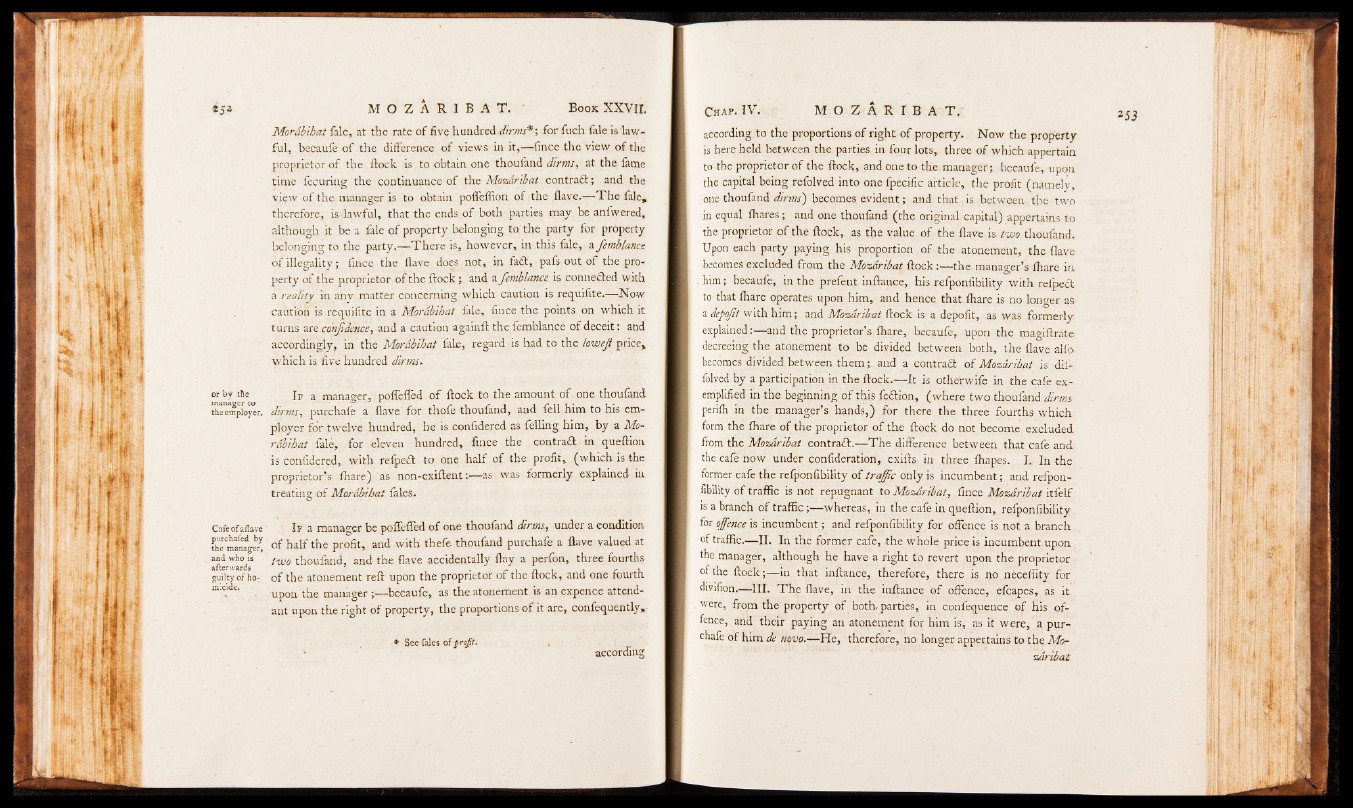
«5* M O Z A R I B A T . Book XXVII.
Mordbihat fale, at the rate of five hundred dirms*; for fuch fale is lawful,
becaufe of the difference of views in it,— fince the view of the
proprietor of the flock is , to obtain one thoufand dims, at the fame
time fecuring the continuance of the Mozdribat contract; and the
view of the. manager is to obtain pofl'effion of the {lave.— T h e fale,
therefore, is lawful, that the ends of both parties may be anfwered,
although it be a fale of property belonging to the. party for property
belonging to, the party.— There is, however, in this fale, a femblance
of illegality i fince the Have, does not, in fa£t, pafs out of the property
of the proprietor of the flock; and a femblance is eonnedted with
a reality in any matter concerning which caution is requifite.— Now
Cahtion is requifite in a Mordbihat fale, fince the points on which it
turns are confidence, and a caution againfl the femblance of deceit: and
accordingly, in the Mordbihat fale, regard is had to the lowefi price,
which is five hundred dirms.
or b* the i F a manager, poffefled o f flock to the amount of , one thoufand
the employer, dirms, purchafe a flave for. thofe thoufand, and fell him to his employer
for twelve hundred, he is confidered as. felling him, by a Mordbihat
fale, for eleven hundred, fince the contradt in queflion
is confidered, with refpedt to one half of the profit, (which is the
proprietor’ s fhare) as non-exiftent:— as was formerly explained,in
treating of Mordbihat fales.
If a manager be poffeffed of one thoufand dirms, under a condition
of half the profit, and with thefe thoufand purchafe a flave valued at.
two thoufand, and the flave accidentally flay a perfon, three fourths
of the atonement reft upon the proprietor of the flock, and one fourth
upon the manager ;— becaufe, as the atonement is an expence attendant
upon the right of property, the proportions of it are, confequently,
Cafe of a/lave
purchafed by
the manager,
,and who is
afterwards
guilty o f homicide.
* See fales o f profit.
accordin:
C h a p . IV. M O Z A R I B A T ,
according to the proportions of right of property. Now the property
is here held between the parties in four lots, three o f which appertain
to the proprietor of the flock, and one to the manager; becaufe, upon
the capital being refolved into one fpecific article, the profit (namely,
one thoufand dirms) becomes evident; and that is between the two
ill equal fhares; and one thoufand (the original capital) appertains to
the proprietor of the flock, as the value of the flave is two thoufand.
Upon each party paying his proportion of the atonement, the flave
becomes excluded from the Mozdribatflock :— the. manager’s fhare in
him; becaufe, in the prefent inftance, his refponfibility with refpedt.
to that fhare operates upon him, and hence that fhare is no longer as
a depofit with him; and Mozdribat flock is a depofit, as was formerly
explained:— and the proprietor’s fhare, becaufe, upon the magiftrate
decreeing the atonement to be divided between both, the flave alfo-
becomes divided between them;, and a contradt of Mozdribat i,s dif-
folved by a participation in the flock.— It is othdrwife in the cafe exemplified
in the beginning of this faction, (where two thoufand dirms
perifh in the manager’s hands,) for there the three fourths-which
form the fhare of the proprietor of the flock do not become excluded
from the Mozdribat contradt.— The difference between that cafe and
the café now under confederation, exifls in three fhapes. J. In the
former cafe the refponfibility of traffic only is incumbent; and refponfibility
of traffic is not repugnant to M ozdribat, fince Mozdribat itfelf
is a branch of traffic;— whereas, in the cafe in queflion, refponfibility
for offence is incumbent; and refponfibility for offence is, not a branch .
of traffic.— II. In the former cafe, ,the vlffiole price is incumbent upon
the manager, although he have a right to revert upon the proprietor ■
of the flock;— in that inftance, therefore, there is no neceffity for
divifion.— III. T h e flave, in the inftance o f offence, efcapes, as it
were, from the property of both, parties, in confequence of his offence,
and their paying an atonement for him is, as it were, a purchafe
of him de novo.— He, therefore, no longer appertains to the Mo~
zdribat